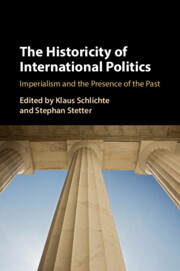Book contents
- The Historicity of International Politics
- The Historicity of International Politics
- Copyright page
- Contents
- Figures
- Contributors
- Acknowledgements
- Introduction
- Part I The Imperial Past and Present in International Politics and IR
- 2 The Colonial Origins – and Legacies – of International Organizations
- 3 Collective Hegemony after Decolonization
- 4 The Historicity of State Formation
- 5 Privateering, Colonialism and Empires
- 6 Where Did the Mongol Empire Go?
- 7 Where Would We Be without the Fog Lifting in Austerlitz?
- Part II Historical Sociology and the Imperial Fundaments of International Politics
- Part III Global History and the Imperial Fundaments of International Politics
- Conclusion
- Index
- References
6 - Where Did the Mongol Empire Go?
The Presences of a Eurasian Steppe-Nomadic Past
from Part I - The Imperial Past and Present in International Politics and IR
Published online by Cambridge University Press: 29 June 2023
- The Historicity of International Politics
- The Historicity of International Politics
- Copyright page
- Contents
- Figures
- Contributors
- Acknowledgements
- Introduction
- Part I The Imperial Past and Present in International Politics and IR
- 2 The Colonial Origins – and Legacies – of International Organizations
- 3 Collective Hegemony after Decolonization
- 4 The Historicity of State Formation
- 5 Privateering, Colonialism and Empires
- 6 Where Did the Mongol Empire Go?
- 7 Where Would We Be without the Fog Lifting in Austerlitz?
- Part II Historical Sociology and the Imperial Fundaments of International Politics
- Part III Global History and the Imperial Fundaments of International Politics
- Conclusion
- Index
- References
Summary
Attempts to re-write recent world history as a long series of struggles against European imperialism are inherently self-defeating, for the effect is exactly what it is purportedly trying to avoid. By making struggle against Europe the sine qua non of the past two hundred years of overall human experience, such an approach privileges Europe, and so is by definition Eurocentric. Furthermore, it would be wrong to assume that only European imperial pasts are present in the contemporary international system. Other imperial systems have also left their marks on historical polities that are kept up by today’s polities. In this chapter, we discuss ho what we have elsewhere baptised the steppe tradition is still alive in parts of Central Asia. It has also left a solid legacy in Turkey, as well as remnants in Russia. The difference between these polities and European ones are often observed. The debt they owe to the Eurasian imperial steppe tradition takes us one step closer to accounting for these differences.
- Type
- Chapter
- Information
- The Historicity of International PoliticsImperialism and the Presence of the Past, pp. 123 - 137Publisher: Cambridge University PressPrint publication year: 2023

